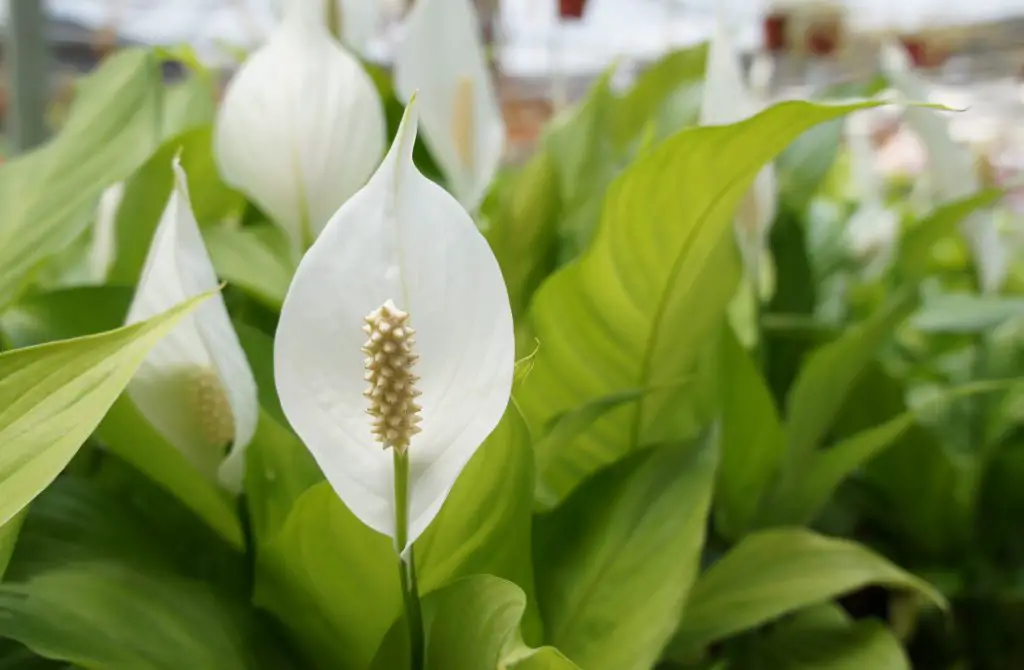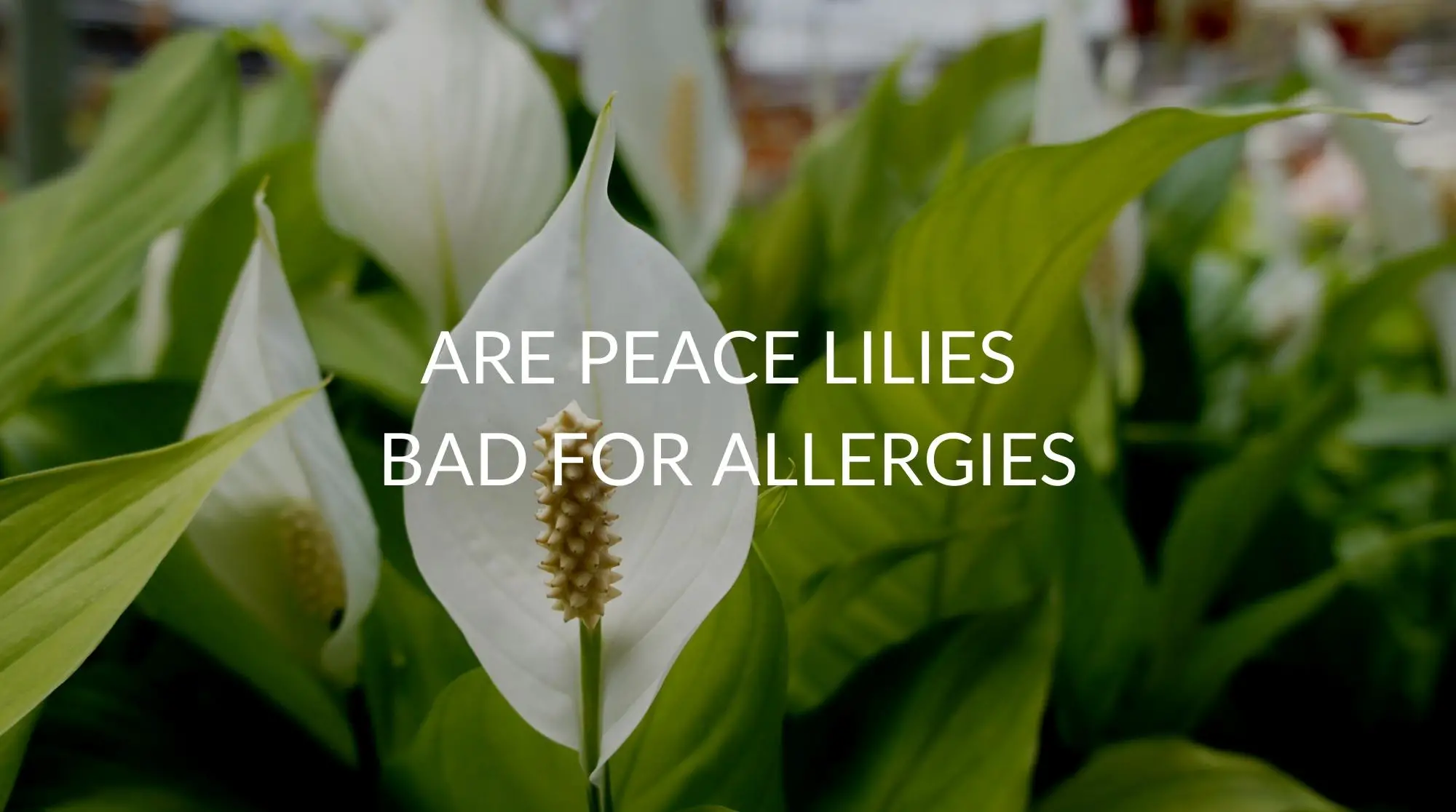Choosing the perfect plant to decorate your home with is hard. This decision is even more crucial if you suffer from allergies to avoid sneeze days and even some life-threatening allergic reactions.
When talking about houseplants, the exquisite low-maintenance Peace Lilies come to mind. However, despite their attractive foliage and ability to purify the air, many wonder whether Peace lilies can do more harm than good when it comes to allergies. So, in this article, we’ll find out whether Peace Lilies can trigger allergies and help you decide whether Peace lilies are right for you!
Do Houseplants Cause Allergies?
Aside from adding colors and beauty to your home, it has been proven by researchers that house plants also help in keeping rooms safer and cleaner. This is because the leaves, as well as the other parts of the plant, work as natural filters by catching airborne particles, lowering moisture levels, and catching allergens.
But this doesn’t mean that all houseplants are completely harmless for your allergies. In fact, any flowering houseplant can cause allergic reactions due to its pollen production capabilities. So, if you have a pollen allergy, it’s best to avoid flowering houseplants like spider plants, sunflowers, orchids, and other similar flowering indoor plants.
Another instance that houseplants may contribute to your allergies is when they become continually moist. According to CDC, As mold builds up due to increased humidity, this can also cause allergic reactions if you’re allergic to mold.
Simply put, some house plants are known to cause allergies, but some can relieve them.
Do Lilies Cause Allergies?
Lilies are mostly known for their strong, perfume-like scents. Although most lilies are pollen-free, some lily family members, such as Asiatic and Longiforum Lilies, are two of the worst plant choices for allergies. This is because some parts of these plants are covered by powdery pollen. Therefore, it is important to carefully choose what type of Lily you will be putting into your home as some might seem harmless, and some can put you in a “sneezy” situation.

Are Peace Lilies Bad for Allergies?
The simple answer to this question is “No.” Peace Lilies are plants that produce heavier and stickier pollens that are less likely to cause allergies. And although they are called Peace “lilies,” these plants are not actually members of the lily family. Yes, that plant family that’s notorious for causing terrible allergic reactions to those with a history of hay fever and other types of allergies.
In contrast, Peace Lilies can even be beneficial in relieving your allergy symptoms. According to this NASA article, these plants are known to do an excellent job filtering some of the most common indoor pollutants in the air: Tetrachloroethylene or PCE, Formaldehyde, and Benzene.
How to Avoid Allergic Reactions with Peace Lilies?
Although it has already been established that Peace Lilies do not directly cause allergic reactions, there are still some additional ways you can do to ensure that your plant environment doesn’t promote any allergies.
Never Let The Soil Of Your Plant Become Too Damp
Even though your Peace Lilies cannot trigger your allergies, the mold growing in the soil can. Mold easily grows in your house plants’ soil mainly due to excessive moisture.
So, avoid putting your Peace Lily in soggy soil. Avoid overwatering your Peace Lily. Not only can it cause a possible mold allergic reaction, but it can also damage your plant.
Remove the Pollen
One more thing that you can do is remove the pollen from the bulb of your peace lily. Cut this part of your plant before it even begins to produce pollen. Doing this prevents the possible onset of allergic reactions that can be caused by pollen from your Peace Lily.
Use a Dehumidifier
If you have several plants in your indoor space, chances are your houseplants can increase the humidity in your room whether you like it or not. Using dehumidifiers can help lower the humidity caused by your Peace Lilies.
Rock On, Rock Under
Putting some aquarium rocks under your Peace Lily pots helps in draining excess water, decreasing the chances of mold growth, decreasing the chances of allergic reactions.
Conclusion
Peace lilies are among the most popular indoor plants due to their uniqueness and ability to create a nice ambiance to a room, whether at home or office. As low-maintenance plants, they can survive medium to low light and do a wonderful job in removing pollutants from the air. However, despite their beauty, some are cautious with Peace Lilies, thinking that they can cause allergic reactions.
In this article, we learned that Peace Lilies, along with their unique beauty, do not cause allergies due to their heavier and stickier pollen. In fact, they are one of the best houseplants for those who suffer from allergies because of their ability to clean the air from indoor pollutants. We also learned some additional ways on how you can make your home safer from allergies.
You can breathe in peace with your Peace Lily!
If you liked this article, make sure you check out the rest of the website. Otherwise, have a great day!









I was having stuffy nose and really itchy eyes… Once we got rid of our bedroom peace lillies, my allergies were gone. So YES, peace lilies DO cause allergies…plain and simple.